Per request, I'm going to announce the upcoming commemorations that I hope to post. For those wanting to look ahead, here's a dated list of the January sanctorial calendar for The Lutheran Church — Missouri Synod. Each is linked to last year's post.
1 The Circumcision and Name of Jesus
2 J. K. Wilhelm Loehe
6 The Epiphany of Our Lord
10 Basil the Great, Gregory of Nazianzus, Gregory of Nyssa
11 The Baptism of Our Lord
18 The Confession of Saint Peter
20 Sarah
24 Saint Timothy
25 The Conversion of Saint Paul
26 Saint Titus
27 Saint John Chrysostom
Technorati Tags: Church Year | liturgical calendar | sanctorial calendar | Christianity | Christian | Lutheran | Lutheranism | Christian feasts | festivals | saints' days | biography | hagiography | commemoration | theology | historical theology | history | Church history | Christian history | Bible history | biblical history | Aardvark Alley
 David, son of Jesse, went from tending his father's flocks to being the greatest of Israel's kings. He ruled from about 1010 to 970 B.C. He was chosen by the Lord and anointed by Samuel to replace the apostate King Saul, for whom David had provided years of faithful service. The events of his life are found from 1 Samuel 16 through 1 Kings 2 and in 1 Chronicles 10 through chapter 29. David's son Solomon succeeded him as king.
David, son of Jesse, went from tending his father's flocks to being the greatest of Israel's kings. He ruled from about 1010 to 970 B.C. He was chosen by the Lord and anointed by Samuel to replace the apostate King Saul, for whom David had provided years of faithful service. The events of his life are found from 1 Samuel 16 through 1 Kings 2 and in 1 Chronicles 10 through chapter 29. David's son Solomon succeeded him as king.David was also gifted musically. Skilled in playing the lyre, he wrote at least seventy-three of the Psalms, including the beloved Psalm 23 and several Messianic prophecies, including the foreshadowing of Christ's crucifixion in Psalm 22.
David's public and private character displayed a mixture of good, for example, his defeat of the giant Goliath, (1 Samuel 17) and evil, as in his adultery with Bathsheba, Uriah's wife, followed by his murder of Uriah, (2 Samuel 11). David's greatness lay in his fierce loyalty to God as Israel's military and political leader. For example, under his leadership, the people of Israel were united into a single nation with Jerusalem as the capital city.
This devotion to the Lord and to the people was coupled with his willingness to acknowledge his sins and ask for God's forgiveness (2 Samuel 12). The great penitential outpouring of Psalm 51 came as a result of his sins against Uriah, as did the thoughts and emotions expressed in Psalm 32.
David's standing before the Lord and his place in the Messianic line are mentioned in many places. Of all of these, Paul's words in Acts 13:22-23 provide a fitting summary: "[The Lord] raised up David to be their king, of whom he testified and said, 'I have found in David the son of Jesse a man after my heart, who will do all my will.' Of this man's offspring God has brought to Israel a Savior, Jesus, as he promised."
Technorati Tags: King David | David | prophet | Israel | King Saul | Samuel | Messianic prophecy | prophecy | Solomon | Jedediah | Goliath | Bathsheba | Uriah | Psalms | psalmist | faithfulness | penitence | grace | Messiah | Jesus | Christ | Jesus Christ | Church Year | liturgical calendar | sanctorial calendar | Christianity | Christian | Lutheran | Lutheranism | Christian feasts | festivals | saints' days | biography | hagiography | commemoration | theology | dogmatics | systematic theology | Christology | Law | Gospel | Law and Gospel | exegetical theology | Bible | Scripture | God's Word | Word of God | Old Testament | historical theology | history | Church history | Christian history | Bible history | biblical history | ancient history | Middle Eastern history | Israelite history | Jewish history | Hebrew history | Aardvark Alley
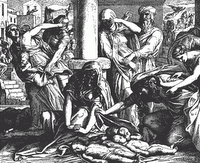 This day commemorates the slaughter of Bethlehem's children by Herod the Great (Matthew 2:16-18), as he attempted to destroy the Usurper to his throne.
This day commemorates the slaughter of Bethlehem's children by Herod the Great (Matthew 2:16-18), as he attempted to destroy the Usurper to his throne.Herod, his jealousy inflamed by the account given by the Wise Men (Matthew 2:7), sent his soldiers to kill all the town's boys two years old and younger in order to protect his throne and lineage. This was one of the last major decisions made in a life filled with vainglory and increasing insanity. His plan went awry, since the Lord sent an angel to warn Joseph, who led Jesus and Mary to safety in Egypt, where they stayed until the tyrant's death.
 The commemorations of Stephen, John, and the Innocents remind us that not all receive the Gift of Christmas with joy. However, God's plan of salvation spreads in spite of hatred. Even today, much of the world actively rejects the Gospel and persecutes those who preach and live it.
The commemorations of Stephen, John, and the Innocents remind us that not all receive the Gift of Christmas with joy. However, God's plan of salvation spreads in spite of hatred. Even today, much of the world actively rejects the Gospel and persecutes those who preach and live it.Yet through all the years, the Church has continued to proclaim Christ — Christ incarnate, Christ crucified, Christ resurrected, Christ ascended, Christ returning. The very resistance of the Devil, the hard-hearts of others, and the testimony of our own sinful natures all provide ample evidence of the world's desperate need for His forgiveness. God grant that we faithfully believe and steadfastly confess this saving message, the Good News of forgiveness of sins in Christ Jesus.
Lection
Psalm 54
Jeremiah 31:15-17
Revelation 14:1-5
Matthew 2:13-18
Collect
Almighty God, the martyred innocents of Bethlehem showed forth Your praise not by speaking but by dying. Put to death in us all that is in conflict with Your will that our lives may bear witness to the faith we profess with our lips; through Lord Jesus, our Christ, who lives and reigns with You and the Holy Spirit, one God, now and forever.
Technorati Tags: Holy Innocents | The Holy Innocents | martyrdom | martyrs | Herod the Great | King Herod | Herod | Magi | Wise Men | Bethlehem | Jesus | Jesus Christ | Christ | Mary | Joseph | Matthew 2:13-18 | Rachel weeping | flight into Egypt | flight to Egypt | Church Year | liturgical calendar | sanctorial calendar | Christianity | Christian | Lutheran | Lutheranism | Christian feasts | festivals | saints' days | biography | hagiography | commemoration | theology | Christology | historical theology | exegetical theology | Church history | Bible history | Bible | Scripture | New Testament | Aardvark Alley
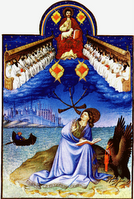 27 December, New Testament
27 December, New TestamentSaint John, Apostle and Evangelist, a son of Zebedee, was one of the twelve apostles. With his brother James and Simon Peter, he formed an inner circle among the Twelve: Those three beheld the Great Catch of Fish (Luke 5:10), the healing of Peter's mother-in-law (Mark 1:29-31), the raising of Jairus' daughter(Mark 5:37; Luke 8:51), the Transfiguration (Matthew 17:1; Mark 9:2; Luke 9:28), and Gethsemane's agony (Matthew 26:37; Mark 14:33).
He expressed willingness to undergo martyrdom (Matthew 20:22; Mark 10:39) — as did the other apostles (Matthew 26:35; Mark 14:31). However, ancient testimony says that even though he was imprisoned and exiled, he was eventually released and died a natural death in Ephesus.
According to Mark 3:17, Jesus gave James and John "the name Boanerges, that is, Sons of Thunder." He is credited with the writing three epistles and one Gospel. He is also the probable author of Revelation, although this identification is less certain.
His symbol in ecclesiastical art is usually the eagle. This and the images used for the other evangelists come from the visions of the four living creatures around God's throne in heaven. See the biography of Saint Matthew for the specifics of each.
Lection
Psalm 11
Revelation 1:1-6
1 John 1:1-2:2
John 21:20-25
Collect
Merciful Lord, cast the bright beams of Your light upon Your Church that we, being instructed in the doctrine of Your blessed apostle and evangelist John, may come to the light of everlasting life; for You live and reign with the Father and the Holy Spirit, one God, now and forever.
Technorati Tags: Saint John | St. John | John | eagle | Sons of Zebedee | Boanerges | Sons of Thunder | apostle | disciple | evangelist | Gospel | Epistle | Revelation | Apocalypse | Saint James | Saint Peter | Saint Matthew | Jesus | Jesus Christ | Christ | four living creatures | exile | Patmos | Church Year | liturgical calendar | sanctorial calendar | Christianity | Christian | Lutheran | Lutheranism | Christian feasts | festivals | saints' days | biography | hagiography | commemoration | theology | Christology | historical theology | exegetical theology | Church history | Bible history | Bible | Scripture | New Testament | Gospels | Evangel | Good News | ecclesiastical art | Christian symbol | symbolism | Aardvark Alley
 Saint Stephen's Day remembers the first recorded martyr of the Church. Stephen knew the gift of Christmas: His Lord came in human flesh to bring forgiveness and as Jesus forgave His killers, so Stephen forgave those whose stones smashed away his life. The account of his calling, witness, and death is in Acts 6:1-8:2. Notice how closely the martyr's responses echo those of His Savior as each approached death.
Saint Stephen's Day remembers the first recorded martyr of the Church. Stephen knew the gift of Christmas: His Lord came in human flesh to bring forgiveness and as Jesus forgave His killers, so Stephen forgave those whose stones smashed away his life. The account of his calling, witness, and death is in Acts 6:1-8:2. Notice how closely the martyr's responses echo those of His Savior as each approached death.In art, Stephen is often represented by the stones which took his life and by the palm branch, an ancient symbol of triumph and, especially in Christianity, of martyrdom. Both stones and branch are prominent in this Carlo Crivelli painting from the Demidoff Altarpiece.
Stephen's feast day supposedly occasioned of a great act of charity by the later martyred Wenceslaus, Kníže of Bohemia. Wenceslaus (or Václav) is remembered in the carol Good King Wenceslaus.
Lection
Psalm 119:137-144
2 Chronicles 24:17-22
Acts 6:8-7:2a, 51-60
Matthew 23:34-39
Collect
Heavenly Father, in the midst of our sufferings for Christ grant us grace to follow the example of the first martyr, Stephen, that we may also look to the One who suffered and was crucified on our behalf and pray for those who do us wrong; through our Jesus Christ, our Lord, who lives and reigns with You and the Holy Spirit, one God, now and forever.
Technorati Tags: Saint Stephen | St. Stephen | Jesus Christ | Jesus | Christ | martyr | Protomartyr | martyrdom | deacon | biblical history | New Testament | church history | Christianity | Christmas | Second Day of Christmas | 2nd Day of Christmas | church calendar | Church Year | Good King Wenceslaus | Wenceslaus | Wenceslas | Václav | Aardvark Alley
The Word became flesh and dwelt among us ... full of grace and truth. John 1:14 ESV
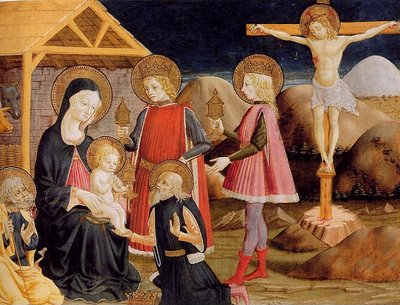
Where ox and ass are feeding?
Good Christians, fear, for sinners here
The silent Word is pleading.
Nails, spear shall pierce Him through,
The cross be borne for me, for you.
Hail, hail the Word made flesh,
The Babe, the Son of Mary.
What Child Is This, Stanza 2

Technorati Tags: Christmas | Xmas | X-mas | Merry Christmas | Christmas | Nativity | Feast of the Nativity | Jesus' Birth | What Child Is This | Jesus | Jesus Christ | Christ | Church Year | liturgical calendar | Christianity | Christian | Lutheran | Lutheranism | Christian feasts | festivals | holy days | theology | historical theology | exegetical theology | history | Church history | Christian history | Bible history | biblical history | Bible | Scripture | Gospel | New Testament | Aardvark Alley
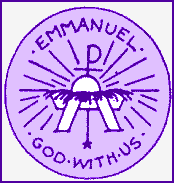 We now arrive at the seventh and final O Antiphon, including related Scriptures, Latin text and English translation, a Latin hymn stanza, and the English versification from the hymn known as O Come, O Come, Emmanuel.
We now arrive at the seventh and final O Antiphon, including related Scriptures, Latin text and English translation, a Latin hymn stanza, and the English versification from the hymn known as O Come, O Come, Emmanuel.℣ O Emmanuel, Rex et legisfer noster, expectatio gentium, et Salvator erum:
℟ veni ad salvandum nos, Domine Deus noster.
℣ O Emmanuel, our King and our Lord, the Anointed for the nations and their | Savior:*
℟ Come and save us, O | Lord our God.
"Therefore the Lord himself will give you a sign. Behold, the virgin shall conceive and bear a son, and shall call his name Immanuel. (Isaiah 7:14)" See also Isaiah 8:6-8; Matthew 1:23; Haggai 2:7 (KJV).
Veni Veni, Emmanuel Captivum solve Israel,
Qui gemit in exsilio, Privatus Dei Filio.
O come, O come, Emmanuel, And ransom captive Israel,
That mourns in lonely exile here Until the Son of God appear.
Rejoice! Rejoice! Emmanuel Shall come to thee, O Israel!
Read the final daily meditations from the O Antiphons by Pastor Cwirla and Pastor Weedon.
Ero Cras!
Unless otherwise noted, Scriptures are quoted from the ESV®
Technorati Tags: Advent | O Antiphons | Oh, Come, Oh, Come, Emmanuel | O Come, O Come, Emmanuel | Emmanuel | O Emmanuel | O Immanuel | O Emanuel | O God with Us | God with Us | Lawgiver | King | Savior| Immanuel | Magnificat | Vespers | Church Year | liturgical calendar | Christianity | Christian | Lutheran | Lutheranism | theology | practical theology | liturgical theology | liturgics | hymnody | worship | singing | LSB | Aardvark Alley
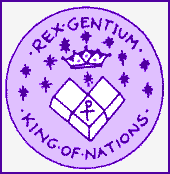 This brings us to the sixth O Antiphon. Again, Latin text and English translation, a Latin hymn stanza, and the English versification from the hymn known as O Come, O Come, Emmanuel are included.
This brings us to the sixth O Antiphon. Again, Latin text and English translation, a Latin hymn stanza, and the English versification from the hymn known as O Come, O Come, Emmanuel are included.℣ O Rex gentium, et desideratus earum, lapisque angularis, qui facis utraque unem:
℟ veni, et salva hominem, quem de limo formasti.
℣ O King of the Nations, the Ruler they long for, the Cornerstone uniting all | people:*
℟ Come and save us all, whom You formed | out of clay.
"For to us a child is born, to us a son is given; and the government shall be upon his shoulder, and his name shall be called Wonderful Counselor, Mighty God, Everlasting Father, Prince of Peace. (Isaiah 9:6)" Also, "He shall judge between the nations, and shall decide disputes for many peoples; and they shall beat their swords into plowshares, and their spears into pruning hooks; nation shall not lift up sword against nation, neither shall they learn war anymore. (Isaiah 2:4)." See also Revelation 15:3; Psalm 118:22; Isaiah 28:16; Matthew 21:42; Mark 12:10; Luke 20:17; Acts 4:11; Ephesians 2:19-21; 1 Peter 2:6.
Veni, Veni, Rex Gentium, Veni, Redemptor omnium,
Ut salvas tuos famulos Peccati sibi conscios.
Oh, come, Desire of nations, bind In one the hearts of all mankind;
Bid Thou our sad divisions cease, And be Thyself our King of Peace.
Rejoice! Rejoice! Emmanuel Shall come to thee, O Israel!
Read today's comments on O Rex Gentium from Pastors Bill Cwirla and William Weedon.
Scripture quoted from the ESV®
Technorati Tags: Advent | O Antiphons | Oh, Come, Oh, Come, Emmanuel | O Come, O Come, Emmanuel | Emmanuel | O Rex Gentium | O King of the Nations | King of the Gentiles | Desire of Nations | King of Peace | Cornerstone | Immanuel | Magnificat | Vespers | Church Year | liturgical calendar | Christianity | Christian | Lutheran | Lutheranism | theology | practical theology | liturgical theology | liturgics | hymnody | worship | singing | LSB | Aardvark Alley
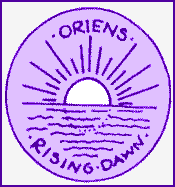 Here follows the fifth of the seven O Antiphons, with Latin text and English translation, a Latin hymn stanza, and the English versification from the hymn known as O Come, O Come, Emmanuel.
Here follows the fifth of the seven O Antiphons, with Latin text and English translation, a Latin hymn stanza, and the English versification from the hymn known as O Come, O Come, Emmanuel.℣ O Oriens, splendor lucis aeternae, et sol justitiae:
℟ veni, et illumina sedentis in tenebris, et umbra mortis.
℣ O Dayspring, splendor of light ever- | lasting:*
℟ Come and enlighten those who sit in darkness and in the sha- | dow of death.
"The people who walked in darkness have seen a great light; those who dwelt in a land of deep darkness, on them has light shined. (Isaiah 9:2)" See also Luke 1:78-79; Malachi 4:2.
Veni, Veni O Oriens, Solare nos adveniens,
Noctis depelle nebulas, Dirasque mortis tenebras.
O come, Thou Dayspring from on high, And cheer us by Thy drawing nigh,
Disperse the gloomy clouds of night, And death's dark shadows put to flight.
Rejoice! Rejoice! Emmanuel Shall come to thee, O Israel!
Continue by reading today's meditation by Pr. Bill Cwirla and this one, from Pr. William Weedon.
Scripture quoted from the ESV®
Technorati Tags: Advent | O Antiphons | Oh, Come, Oh, Come, Emmanuel | O Come, O Come, Emmanuel | Emmanuel | O Oriens | O Dayspring | Dayspring from on High | O Dawn of the East | O Rising Dawn | Immanuel | Magnificat | Vespers | Church Year | liturgical calendar | Christianity | Christian | Lutheran | Lutheranism | theology | practical theology | liturgical theology | liturgics | hymnody | worship | singing | LSB | Lutheran Service Book | Aardvark Alley
The Apostle Thomas (Hebrew or Aramaic for "twin") was also called Didymus (Greek for "twin"); either his parents gave him a most peculiar name or else he consistently went by his nickname.
 Absent when the Risen Lord appeared to the other apostles on the evening of Easter Day, He refused to believe that Christ had indeed risen until he had seen him for himself. When he saw Him the following week, he said to Jesus, "My Lord and My God."
Absent when the Risen Lord appeared to the other apostles on the evening of Easter Day, He refused to believe that Christ had indeed risen until he had seen him for himself. When he saw Him the following week, he said to Jesus, "My Lord and My God."Because of this, he has been known ever since as "Doubting Thomas," although "Disbelieving Thomas" or even "Faithless Thomas" probably would be more accurate. See John 20:19-29 for the full account.
We also remember his earlier words, when Jesus announced His intention of going to Jerusalem, even though His life was in danger there: Thomas said to the others, "Let us also go, that we may die with him." (John 11:7-16) Thus, we see that Thomas was sturdily loyal.
At the Last Supper, Jesus said: "In my Father's house are many rooms. If it were not so, would I have told you that I go to prepare a place for you? And if I go and prepare a place for you, I will come again and will take you to myself, that where I am you may be also. And you know the way to where I am going." Thomas was the one who responded, "Lord, we do not know where you are going. How can we know the way?" To this Jesus answered: "I am the way, and the truth, and the life. No one comes to the Father except through me. (see John 14:1-6)"
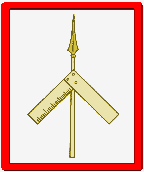 John 21 records Thomas as one of the seven disciples fishing on the Sea of Galilee when the Lord appeared to them. Aside from these Biblical accounts, he appears only as a name on lists of the Apostles.
John 21 records Thomas as one of the seven disciples fishing on the Sea of Galilee when the Lord appeared to them. Aside from these Biblical accounts, he appears only as a name on lists of the Apostles.A few centuries later, a story circulated in the Mediterranean world that he went to preach in India; a community in the Kerala district claims descent from Christians converted by the preaching of Thomas. Among Indian Christians, tradition claims that Thomas was speared to death near Madras, and accordingly is often pictured holding a spear.
Since he was credited with the building up of the Church through his missionary journeys, a carpenter's square also is a regular symbol of the apostle.
Lection
Psalm 126
Habakkuk 2:1-4
Hebrews 10:35-11:1
John 14:1-7 or 20:24-29
Collect
Almighty and ever living God, who upheld and strengthened Your apostle Thomas with sure and certain faith in Your Son's resurrection, grant us perfect and unwavering belief in Jesus Christ, our resurrected Lord and God, that our faith may never be found wanting in Your sight; through this same Jesus Christ, who lives and reigns with You and the Holy Spirit, one God, now and forever.
Technorati Tags: Saint Thomas | St. Thomas | Doubting Thomas | Jesus | Jesus Christ | Christ | Church Year | liturgical calendar | sanctorial calendar | Christianity | Christian | Lutheran | Lutheranism | Christian feasts | festivals | saints' days | biography | hagiography | commemoration | theology | historical theology | exegetical theology | history | Church history | Christian history | Bible history | biblical history | Bible | Scripture | Gospel | New Testament | Aardvark Alley
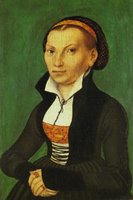 Financial and marital circumstances led Katharina von Bora's (b.1499) parents to place her in a convent when she was but a child of five. In 1515, she became a nun. Later, she and some of her associates heard clear proclamation of Gospel through the Lutheran Reformation. This Gospel message soon changed their beliefs and their lives.
Financial and marital circumstances led Katharina von Bora's (b.1499) parents to place her in a convent when she was but a child of five. In 1515, she became a nun. Later, she and some of her associates heard clear proclamation of Gospel through the Lutheran Reformation. This Gospel message soon changed their beliefs and their lives.Convinced that the vows they had taken were contrary to God's word, Katharina joined eight other nuns who desired to renounce the cloistered life. In April 1523 they were rescued from the convent and smuggled away to Wittenberg among empty herring barrels. Martin Luther and his associates helped some of these women return to their former homes while placing others with good families. Most of them were soon married.
However, Luther and friends found that dealing with "Katie" was no easy task. She rejected a number of prospective husbands, finally declaring that she'd marry either Martin or Nikolaus von Amsdorf — and nobody else. While he worried that a violent death would soon part him from any bride, Martin gave in to the stubborn young woman. They were married on 13 June 1525. Their happy marriage was blessed with six children. Katie skillfully managed the Luther household, which seemed to grow ever larger because of his generous hospitality.
 Martin and Katie certainly butted heads at times. Perhaps that's why Luther sometimes called her kette (chain). However, the reformer truly adored his bride, also naming her "my Rib" and "my lord Katie." The freedom and joy that he experienced in his marriage received testimony from his 1535 Commentary on Galatians, which Luther lovingly called, "My Katie von Bora."
Martin and Katie certainly butted heads at times. Perhaps that's why Luther sometimes called her kette (chain). However, the reformer truly adored his bride, also naming her "my Rib" and "my lord Katie." The freedom and joy that he experienced in his marriage received testimony from his 1535 Commentary on Galatians, which Luther lovingly called, "My Katie von Bora."After Martin's death in 1546, Katie remained in Wittenberg. Sadly, she lived most of her remaining years in poverty. Her 1552 death came after an accident she suffered while traveling with her children to Torgau in order to escape the plague.
Katharina Luther remains a wonderful example of godly womanhood, beautifully portraying the "excellent wife" celebrated in Proverbs 31:10-31.
For more on Katie Luther, you visit the online exhibit at Concordia Historical Institute. The portraits of Martin and Katharina Luther were painted by Lucas Cranach the Elder during the first year of their marriage. The originals are in the Wartburg Collection in Eisenach.
Lection
Psalm 128
Proverbs 31:10-31 or 31:10-12, 17, 20, 23, 25-31
1 Corinthians 7:1-9
John 3:25-30
Collect
Dear heavenly Father, You establish marriage to bless and benefit all mankind and to testify to the world of the marriage of Christ and His Bride the Church. Grant that, as You led Katharina von Bora to become the wife of Martin Luther and, through her, blessed not only him but all Christendom, so You would also seal and protect marriages in our day, that families, society, and Church would be strengthened, stabilized, and nurtured until You call us to the wedding feast of the Lamb in His kingdom, which has no end; through this same Bridegroom, our Lord Jesus Christ, who lives and reigns with You and the Holy Spirit, one God, now and forever.
Hymn Stanza
A world that disregarded The gift of married life
Saw God call saintly Katie As Martin’s faithful wife.
Her self she gave completely To him, who loved his Rib;
Submission, strength, and courage, Her testaments, still live.
Commemorative hymn stanza from Ask the Pastor is © 2006 by Walter P. Snyder and used according to permission granted.
Technorati Tags: Katie Luther | Katharina von Bora | Katharina von Bora Luther | Martin Luther | worship | history | Church Year | liturgical calendar | Christianity | orthodox Christianity | Christian | Christian | Lutheranism | Lutheran | festivals | saints' days | biography | hagiography | commemorations | lectionary | theology | historical theology | Lutheran Reformation | Reformation | Church history | Christian history | German history | European history | Saxon history | Lutheran history | Aardvark Alley
The days following Christmas are sometimes called the "Witness Days." The Greek word for "witness" is "martyr" and these days remind us that this sinful world hates the Gospel message of forgiveness in Christ Jesus.
Ask the Pastor has a longer article on The Witness Days. It deals specifically with "dragging all this 'blood and violence' into the beauty of Christmas." It explains that "Jesus was born flesh and blood, and if we ignore the violence that was done both to Him and to others because of Him, then we are not fully prepared to face this world. His blood shed for us on Calvary became the lifeblood of the world."
While I plan to post for each of these days, I offer links so others may prepare in advance for these festivals and commemorations. Traditionally, the 2nd, 3rd, and 4th Days of Christmas (26-28 December) remember Saint Stephen, Saint John, Apostle and Evangelist, and The Holy Innocents.
Some traditions commemorate other witness on subsequent days. James Kiefer uses an Episcopal liturgical calendar to establish the basis for The Witness Days. The Lutheran Church — Missouri Synod listings vary from those included by Kiefer. For example, on 29 December, Kiefer remembers Thomas à Becket while the LCMS calendar calls for the Commemoration of David.
Kiefer closes his article on the Witness Days with this excellent observation: "On January 1st, we celebrate the Circumcision of Christ. Since we are more squeamish than our ancestors, modern calendars often list it as the feast of the Holy Name of Jesus, but the other emphasis is the older. Every Jewish boy was circumcised (and formally named) on the eighth day of his life, and so, one week after Christmas, we celebrate the occasion when Our Lord first shed His blood for us. It is a fit close for a week of martyrs, and reminds us that to suffer for Christ is to suffer with Him."
Technorati Tags: Saint Stephen | Saint John | The Holy Innocents | King David | Jesus Christ | Jesus | Christ | martyr | Witness Days | martyrdom | church history | Christianity | Christmas | church calendar | Church Year | Aardvark Alley
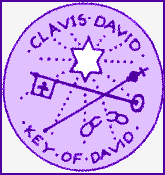 This is the fourth of the seven O Antiphons, with Latin text and English translation, a Latin hymn stanza, and the English versification from the hymn known as O Come, O Come, Emmanuel.
This is the fourth of the seven O Antiphons, with Latin text and English translation, a Latin hymn stanza, and the English versification from the hymn known as O Come, O Come, Emmanuel.℣ O Clavis David, et sceptrum domus Israel: qui aperis, et nemo claudit; claudis, et nemo aperit:
℟ veni et educ vinctum de domo carceris, sedentem in tenebris, et umbra mortis.
℣ O Key of David, and Scepter of the House of Israel, You open and no one can close, You close and no one can | open:*
℟ Come and rescue the prisoners who are in darkness and the shad- | ow of death.
"I will place on his shoulder the key of the house of David. He shall open, and none shall shut; and he shall shut, and none shall open. (Isaiah 22:22)" "Of the increase of his government and of peace there will be no end, on the throne of David and over his kingdom, to establish it and to uphold it with justice and with righteousness from this time forth and forevermore. The zeal of the Lord of hosts will do this. (Isaiah 9:7)" See also Revelation 3:7.
Veni, Clavis Davidica, regna reclude caelica,
fac iter tutum superum, et claude vias inferum.
O come, Thou Key of David, come, And open wide our heav'nly home;
Make safe the way that leads on high, And close the path to misery.
Rejoice! Rejoice! Emmanuel Shall come to you, O Israel!
Here's more from Pastor Cwirla and Pastor Weedon.
Scripture quoted from the ESV®
Technorati Tags: Advent | O Antiphons | Oh, Come, Oh, Come, Emmanuel | O Come, O Come, Emmanuel | Emmanuel | O Clavis David | O Key of David | Immanuel | Magnificat | Vespers | Church Year | liturgical calendar | Christianity | Christian | Lutheran | Lutheranism | theology | practical theology | liturgical theology | liturgics | hymnody | worship | singing | LSB | Lutheran Service Book | Aardvark Alley
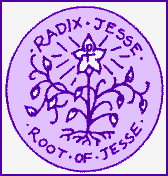 Here follows the third of the O Antiphons with Scriptures, Latin and English texts of the antiphon, a Latin hymn stanza, and the English versification from the hymn we know as O Come, O Come, Emmanuel. (The English language renditions are from the Lutheran Service Book.)
Here follows the third of the O Antiphons with Scriptures, Latin and English texts of the antiphon, a Latin hymn stanza, and the English versification from the hymn we know as O Come, O Come, Emmanuel. (The English language renditions are from the Lutheran Service Book.)℣ O Radix Jesse, qui stas in signum populorum, super quem continebunt reges os suum, quem gentes deprecabuntur;
℟ veni ad liberandum nos, iam noli tardere.
℣ O Root of Jesse, standing as an ensign before the peoples, before whom all kings are mute, to whom they will do | homage:*
℟ Come quickly to de- | liver us.
"There shall come forth a shoot from the stump of Jesse, and a branch from his roots shall bear fruit. (Isaiah 11:1)" "In that day the root of Jesse, who shall stand as a signal for the peoples — of him shall the nations inquire, and his resting place shall be glorious. (Isaiah 11:10)" Jesse was the father of King David; Micah prophesied that the Messiah would be of the house and lineage of David and be born in David's city, Bethlehem (Micah 5:2). See also Romans 15:12; Revelation 5:5.
Veni, O Jesse Virgula, Ex hostis tuos ungula,
De spectu tuos tartari Educ et antro barathri.
O come, Thou Branch of Jesse's tree, Free them from Satan's tyranny
That trust Thy mighty pow'r to save, And give them vict'ry o'er the grave.
Rejoice! Rejoice! Emmanuel Shall come to you, O Israel!
Please see also what Pastor Cwirla and Pastor Weedon wrote.
Scripture quoted from the ESV®
Technorati Tags: Advent | O Antiphons | Oh, Come, Oh, Come, Emmanuel | O Come, O Come, Emmanuel | Emmanuel | O Radix Jesse | O Root of Jesse | Immanuel | Magnificat | Vespers | Church Year | liturgical calendar | Christianity | Christian | Lutheran | Lutheranism | theology | practical theology | liturgical theology | liturgics | hymnody | worship | singing | LSB | Lutheran Service Book | Aardvark Alley
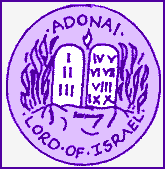 This is the second of the O Antiphons with Scriptures, Latin and English texts of the antiphon, a Latin hymn stanza, and the English versification from the hymn we know as O Come, O Come, Emmanuel. (The English language renditions are from the Lutheran Service Book.)
This is the second of the O Antiphons with Scriptures, Latin and English texts of the antiphon, a Latin hymn stanza, and the English versification from the hymn we know as O Come, O Come, Emmanuel. (The English language renditions are from the Lutheran Service Book.)"With righteousness he shall judge the poor, and decide with equity for the meek of the earth; and he shall strike the earth with the rod of his mouth, and with the breath of his lips he shall kill the wicked. Righteousness shall be the belt of his waist, and faithfulness the belt of his loins. (Isaiah 11:4-5)" "For the Lord is our judge; the Lord is our lawgiver; the Lord is our king; he will save us. (Isaiah 33:22)" See also Exodus 3; Micah 5:2; Matthew 2:6.
℣ O Adonai, et dux domus Israel, qui Moysi in igne flammae rubi apparuisti, et ei in Sina legem dedisti:
℟ veni ad redimendum nos in brachio extento.
℣ O Adonai and Ruler of the House of Israel, who appeared to Moses in the burning bush and gave him the Law on | Sinai:*
℟ come with an outstretched arm and re- | deem us.
Veni, Veni, Adonai, Qui populo in Sinai
Legem dedisti vertice In maiestate gloriae.
O come, O come, Thou Lord of might, Who to Thy tribes on Sinai's height
In ancient times didst give the Law In cloud and majesty and awe.
Rejoice! Rejoice! Emmanuel Shall come to thee, O Israel!
Read some more from Pastors Bill Cwirla and William Weedon.
Scripture quoted from the ESV®
Technorati Tags: Advent | O Antiphons | Oh, Come, Oh, Come, Emmanuel | O Come, O Come, Emmanuel | Emmanuel | O Adonai | O Lord | O Lord and Ruler of the House of Israel | Immanuel | Magnificat | Vespers | Church Year | liturgical calendar | Christianity | Christian | Lutheran | Lutheranism | theology | practical theology | liturgical theology | liturgics | hymnody | worship | singing | LSB | Lutheran Service Book | Aardvark Alley
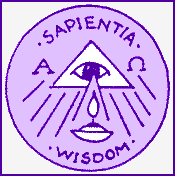 This is the first of the O Antiphons with relevant Scriptures, Latin and English texts, the corresponding Latin hymn stanza, and the English versification from the hymn O Come, O Come, Emmanuel. (The English language renditions are from the Lutheran Service Book.)
This is the first of the O Antiphons with relevant Scriptures, Latin and English texts, the corresponding Latin hymn stanza, and the English versification from the hymn O Come, O Come, Emmanuel. (The English language renditions are from the Lutheran Service Book.)℣ O Sapientia, quae ex ore Altissimi prodiisti, attingens a fine usque ad finem fortiter, suaviterque disponens omnia:
℟ veni ad docendum nos viam prudentiae.
℣ O Wisdom, proceeding from the mouth of the Most High, permeating all creation, mightily ordering | all things:*
℟ Come and teach us the way of | prudence.
"And the Spirit of the Lord shall rest upon him, the Spirit of wisdom and understanding, the Spirit of counsel and might, the Spirit of knowledge and the fear of the Lord. And his delight shall be in the fear of the Lord. (Isaiah 11:2-3)" "This also comes from the Lord of hosts; he is wonderful in counsel and excellent in wisdom. (Isaiah 28:29)" See also Proverbs 1:20; Proverbs 8-9 and 1 Corinthians 1:30.
Veni, O Sapientia, Quae hic disponis omnia,
Veni, viam prudentiae Ut doceas et gloriae.
O come, Thou Wisdom from on high, Who ord'rest all things mightily;
To us the path of knowledge show, And teach us in her ways to go.
Rejoice! Rejoice! Emmanuel Shall come to thee, O Israel!
You are invited to read more from Pastor Cwirla and Pastor Weedon.
Scripture quoted from the ESV®
Technorati Tags: Advent | O Antiphons | Oh, Come, Oh, Come, Emmanuel | O Come, O Come, Emmanuel | Emmanuel | O Sapientia | O Wisdom | O Wisdom from on High | Immanuel | Magnificat | Vespers | Church Year | liturgical calendar | Christianity | Christian | Lutheran | Lutheranism | theology | practical theology | liturgical theology | liturgics | hymnody | worship | singing | LSB | Lutheran Service Book | Aardvark Alley
 We count down the final days of Advent using the traditional monastic antiphons to the Magnificat. Most of English speaking Christendom knows these antiphons through their versification, Oh, Come, Oh, Come, Emmanuel. Beginning in eternity, the antiphons follow a rough chronology through history until the coming of Immanuel, Hebrew for "God [is] with Us" (see Isaiah 7:14; Matthew 1:23)
We count down the final days of Advent using the traditional monastic antiphons to the Magnificat. Most of English speaking Christendom knows these antiphons through their versification, Oh, Come, Oh, Come, Emmanuel. Beginning in eternity, the antiphons follow a rough chronology through history until the coming of Immanuel, Hebrew for "God [is] with Us" (see Isaiah 7:14; Matthew 1:23)Thus, the first stanza that we normally sing of the hymn is actually the last of the antiphons, sung on 23 December. By Vespers on the 24th, it's time to remove the final vestiges of Advent and enter into Christmas.
 The order itself, whether by design or coincidence, forms a Latin reverse acrostic. The initial address for the coming Savior in each antiphon is as follows: Sapientia, Adonai, Radix, Clavis, Oriens, Rex, and Emmanuel. Taking each title's first letter and writing the result backwards yields "ero cras"; normally this is rendered, "I shall be [with you] tomorrow." Thus our Lord promises to return for us and so He leads us to pledge to join together in His worship while still on earth.
The order itself, whether by design or coincidence, forms a Latin reverse acrostic. The initial address for the coming Savior in each antiphon is as follows: Sapientia, Adonai, Radix, Clavis, Oriens, Rex, and Emmanuel. Taking each title's first letter and writing the result backwards yields "ero cras"; normally this is rendered, "I shall be [with you] tomorrow." Thus our Lord promises to return for us and so He leads us to pledge to join together in His worship while still on earth.Through the next week, I hope to post each day's antiphon in Latin, its translation from Lutheran Service Book, the Latin hymn verse, and the corresponding hymn stanza of O Come, O Come, Emmanuel from LSB. If you don't want to wait for each day's antiphon, I've linked to each individually from last December's archives.
Look also for daily links to writings by Pastors Bill Cwirla and William Weedon.
Posts in the Series:
† O Sapientia — O Wisdom
† O Adonai — O Lord and Ruler
† O Radix Jesse — O Root of Jesse
† O Clavis David — O Key of David
† O Oriens — O Dayspring
† O Rex Gentium — O King of the Nations
† O Emmanuel — O God with Us
Technorati Tags: Advent | O Antiphons | Oh, Come, Oh, Come, Emmanuel | O Come, O Come, Emmanuel | Emmanuel | Emanuel | Emanuel | Magnificat | Vespers | Church Year | liturgical calendar | Christianity | Christian | Lutheran | Lutheranism | theology | practical theology | liturgical theology | liturgics | hymnody | worship | singing | LSB | Lutheran Service Book | Aardvark Alley

